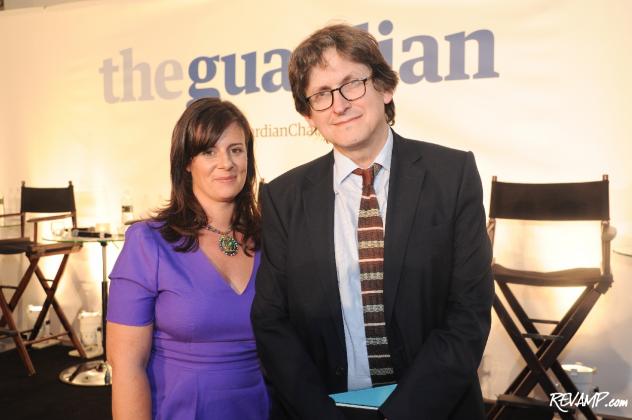|
| News >> Story |
Guardian US Formally Launches; UK Newspaper Seeks To Leverage 'Outsider' Status To Disrupt Old Media...By Daniel Swartz on May 2, 2012
Guardian US Editor-in-Chief Janine Gibson and Guardian News & Media Editor-in-Chief Alan Rusbridger.
Be sure to check out all 63 of our photographs from this event HERE!
SHAW -- Just as President Obama was addressing the American people live from Afghanistan on Tuesday evening, a prescient panel was taking place inside the airy walls of Long View Gallery on the role today’s media plays in both exposing and obscuring the truth about current events.
 Hosted by the recently opened U.S. office of London-based media company The Guardian, Tuesday night’s discussion assembled a handful of disparate voices from both sides of the aisle, in search of the media’s role in “post-truth politics,” as a gateway to introducing Washington audiences to the British daily.  Moderated by Guardian feature writer and columnist Gary Younge, the panel consisted of Buzzfeed/Rolling Stone’s Michael Hastings, The Raben Group’s Jamal Simmons, GQ/The Guardian’s Ana Marie Cox, The Atlantic’s Molly Ball, and the Texas Public Policy Foundation’s Josh Trevino.   And while the topics up for discussion (the democratization of the news by the Internet, the loss of objective reporting, the so-called “uninformed public”, Hilary Rosen’s recent remarks about the Romney campaign, Obama’s religious beliefs, etc.) were certainly far from new, they nevertheless served to highlight the diversity of the opinions being propagated by the media establishment – new (Internet) or old (print).   Leveraging its self-described “disruptor” status, The Guardian seeks to provide its own perspective on current events to U.S. readers outside of the confines of traditional media, much as it has done in England.  “It was only by being an outsider that The Guardian could have done the phone hacking story,” remarked Guardian News & Media Editor-in-Chief Alan Rusbridger. “No one wanted to believe that story…it was being an outsider that enabled us to [keep] going.”  “I think it’s being an outsider -- not being owned by shareholders -- that enables us to take a view of the future of media and journalism, which is different from other people, and enables us to innovate and to do extraordinary things…”  The creation of a U.S. outpost for The Guardian is a natural progression for the overseas publication, given that a full third of its online audience originates stateside. Legacy media players beware! Be sure to check out all 63 of our photographs from this event HERE!
Tags:Long View Gallery
|
 |
Copyright © 2008-2018 Revamped Media, Inc. All rights reserved. |







